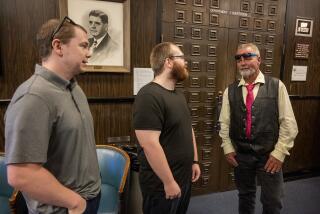Mother’s Assisted Suicide Tears Her Grieving Family Asunder
- Share via
BUFFALO, N.Y. — John Bement held a spoonful of vanilla pudding to his wife’s lips. It was laced with the drugs she had been hoarding for her suicide.
He sat on a bedside stool, she on a bedside commode. Her daughter, Cynthia Hull, looked on.
It had been seven years since the doctors told Judith Bement that the weakness in her left foot, which had been giving her trouble handling the clutch of her truck, was Lou Gehrig’s disease. For the last two years, the once vigorous, hard-working woman of 57 had been paralyzed.
“We’ve managed before,” John Bement would tell his wife of 33 years. “We’ll manage again.”
But now, according to Hull, her mother had given up. She opened her mouth and swallowed the spoonful. And with that, the transformation of John Bement began: from husband to widower to convicted killer, found guilty of manslaughter on Feb. 20.
It was then, too, that a gulf began to open between Hull and her sister, Susan Randall, who was so distraught that she helped police gather evidence by secretly taping her conversations with Bement and Hull.
Hull, a 39-year-old mother of two teenagers, says her stepfather was fulfilling a promise he had made out of love when he fed his wife the pudding that would help end her life. Mixed in were crushed sedative and antidepressant pills that her mother had saved for months, even years.
“My dad really didn’t want my mother to die. He really didn’t,” Hull said. “And neither did I.”
But her sister is not convinced.
Susan Randall was not with her mother in her last hours on June 28, 1996. She had left Judith Bement’s home in Springville, 25 miles south of Buffalo, shortly after her sister arrived for a visit.
Her mother had been having a good day, Randall said. Moreover, she did not say a final goodbye or leave a message explaining her wishes.
“Closure was a real big thing for her,” Randall, 38, said. “My mom would not have left this Earth without closure.”
Randall went so far as to help state police investigate the death by wearing a wire to tape her sister and stepfather as they relived that night.
Judith Bement was once a dynamo with a manicure and a hair-do who had fulfilled her dream of driving big rigs cross-country with her husband in the business they built together.
But then came Lou Gehrig’s disease--amyotrophic lateral sclerosis--which destroys nerves in the brain and spinal cord. No cure is known.
It had made Judith Bement’s hands and feet swollen and useless, her cheeks constantly flushed. She had gained 50 pounds. She had gone from walker to wheelchair to full paralysis.
She tried everything: exotic diets; a “detoxification” therapy that entailed capping her teeth with porcelain; $10,000 spent on experimental drugs.
“The disease had consumed her,” says Hull, a medical receptionist. “She couldn’t fight it any longer. She was tired of fighting it. In her mind, she had done everything she could.”
In 1991, the year Judith Bement became wheelchair-bound, she and Hull bought “Final Exit,” a how-to paperback on suicide.
Here is how Hull describes the night her mother died:
Judith Bement started by telling her husband to pick up “Final Exit” and follow its instructions.
“That’s what I want you to do,” Hull recalls her mother telling him.
Bement began thumbing through the pages.
“Well, you need vodka. I don’t have any vodka in the house,” he said.
“Well, I guess you’ve got to get some,” his wife replied.
While Bement went to the store, Hull prepared the pills. Soon Judith Bement would be dead.
Randall, a mother of two, sells Tupperware and does the books for her husband’s plumbing business. She stops short of claiming that her sister and stepfather forced her mother to die. But she believes they could have talked her out of it.
“When someone’s miserable, you cheer them up. You don’t encourage them to take their life,” she said.
She has no harsh words for her sister, or for the man who has been their stepfather since they were little girls. But while Hull calls Bement “my dad,” Randall implies her estrangement by referring to him as “Mr. Bement.”
Hull says she cannot understand her sister helping the prosecution. “How can she live with herself?” she wonders.
She insists her mother willingly took the poisoned pudding.
“She just chewed away and swallowed it down and opened her mouth for another bite until he fed it to her,” she said.
“It was all emotional,” she recalled, with her stepfather repeatedly telling his wife: “Really, Judy, we don’t have to do this.”
She said her mother drank vodka, took more pills, then asked to be put to bed, while Hull left to pick up her 11-year-old daughter from a friend’s house.
In a conversation secretly taped by Randall on July 31, 1996, Bement, 57, told what happened next. Played to the Erie County Court jury, it gives a disturbing, even excruciating, insight into a family tragedy.
Bement is heard describing his wife as “just laying there, and she was mumbling stuff, and I thought . . . with all these damn pills in her, what am I going to do? Call the paramedics and have them pump her stomach?”
He worries that if she is revived, she may have brain damage and be angry at him. He then performs the final step in the “Final Exit” instructions, putting a plastic bag over his wife’s head.
Was she awake, Randall asks. “I mean, did she know you were doing that? I just need peace of mind.”
“Well, I’ve got problems with that myself,” Bement replies. “I don’t know. She was not totally out, but she wasn’t conscious.”
About a month after her mother’s death, Randall told a Roman Catholic priest what happened, then her mother’s attorney. State police began investigating when they received a tip, prosecutor Christopher Belling said.
A grand jury indicted Bement but not Hull.
Carol Lerminiaux, a friend of Judith Bement, was one of several witnesses who testified that Judith Bement had begged them repeatedly to help her commit suicide.
Her husband didn’t want to talk about it, Judith Bement told them. “He thinks I’m going to get better.”
Lerminiaux, a hairdresser, said Judith Bement made her count the hoarded pills at night. She said Judith Bement wanted her help in committing suicide, but it was against her religious beliefs.
“I loved her, but I couldn’t,” she cried on the witness stand. She, like Randall, is Catholic. Hull is Protestant. The Bements are described by friends as agnostic.
Bement did not take the stand at his four-day trial and wouldn’t comment afterward. He is free on bond awaiting sentencing in May for second-degree manslaughter. He could get anything from probation to 15 years in prison.
Bement’s attorney, Edward Cosgrove, said Bement told him: “I’ve caused enough problems for everybody. I want us all to heal. I never want to talk about it again.”
The sisters no longer speak to each other.
“Maybe a lot of people would say, well you had the choice to walk away,” Hull said, “and we could have. But we loved this woman very much.
“We both agree if we had to do it all over again for my mother, we’d do it again.”
Randall, too, remains adamant: “My mom did not want to die that night.”
More to Read
Sign up for Essential California
The most important California stories and recommendations in your inbox every morning.
You may occasionally receive promotional content from the Los Angeles Times.













